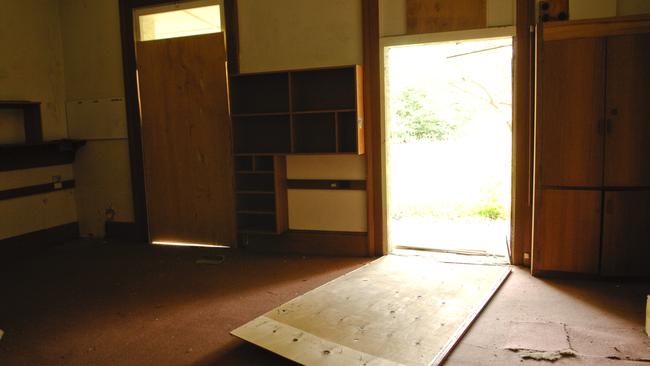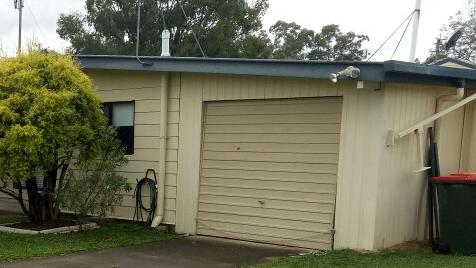Squatter’s rights explained: What can homeowners do to evict them
As Queensland vacancy rates continue to tighten, so do concerns over a rise in squatters. Here’s what you need to know if a squatter moves in.
QLD News
Don't miss out on the headlines from QLD News. Followed categories will be added to My News.
When Caboolture man Lyle Creffield allowed a person to work on part of his rental property and live there free of charge, he had no idea of the legal ramifications.
Mr Creffield didn’t have a legitimate rental contract in place and held little power in removing the man from his property, with the squatter finally evicted months later after Mr Creffield took the matter to civil court and obtained a warrant.
So what happens when a friend, loved one, or ex-tenant claims squatter’s rights on your rental home?

How much power do police hold in removing someone who is squatting?
And what makes a tenancy contract legally binding?
The Courier-Mail asked the experts what rights landlords have if their tenant turns squatter.
When dealing with a squatter the first step most landlords would assumedly take is seeking help from the Residential Tenancies Authority.
But an RTA spokesman said the body is limited to only enforcing the Residential Tenancies and Rooming Accommodation Act 2008 which is the godfather document that outlines the rights and responsibilities for parties involved in individual residential tenancy agreements.
The Act was amended to allow a residential owner to apply to the Queensland Civil and Administrative Tribunal (QCAT) to get a warrant of possession in circumstances where there is no residential tenancy agreement in effect for the premises and a person is occupying the premises without the owner’s consent.
This means that when a landlord or property owner believes they are dealing with a squatter, whether that involves someone who has failed to move out, including a friend or family member, will have to take their matter to civil court.
“A property owner who suspects their premises is being occupied by squatters should consider seeking independent legal advice,” the RTA spokesman said.
Police hold powers to remove trespassers but rarely become involved in rental tenancy disputes as a court can only determine whether a legitimate tenancy contract was in place.
This is hard to tell when an agreement has been made verbally or on good faith with no rental

Real Estate Institute of Queensland (REIQ) chief executive Antonia Mercorella said Mr Creffield’s squatter situation was uncommon however, she warned that minimal vacancy rates could lead to a potential rise in squatters due to relaxed “mates rates” arrangements.
“This Mr Creffield) is an exceptional story. Having said that, I do think we are facing a housing crisis in this state … it may be in the current environment, we are going to see people seek some safe shelter, and squat,” she said.
“In this particular case it sounds like the person was living with consent of property owner, which is an important distinguishing feature, but it also sounds like the terms of the agreement aren't clear which tells a story about the danger of a verbal agreement.
“In this instance it sounds like an exchange for services with no bond et cetera, that could have still upheld as an agreement in my views, but you can imagine how difficult it is for QCAT to determine what facts are there when relying on people’s words and memories.”

LEGITIMATE CONTRACT
Ms Mercorella said most written agreements would substantiate a contract however, it is always best to use an official RTA form wherever possible.
“The RTA actually put out a tenancy agreement parties can use free of charge.”
“The good thing about it is a prescribed document, setting out the basics of the rent amount, terms of agreement, a lay person can complete it and it doesn’t have to be done with a lawyer.”
She noted that laws around adverse possession (squatters laws) differ across each Australian jurisdiction and there are some rare circumstances where those who are not legal owners, could end up having a right to reside in the property.
“Sometimes you’re wanting to see a property settlement, you're staying there, circumstances arrive, a property doesn’t settle, then parties enter into a written agreement and if it’s not in writing, it can lead to a dispute,” Ms Mercorella said.
“If you are going to give early possession before a property settlement, best to seek a lawyer and make sure you have the right qualifications in the early entry licence, if not it could end up in court because they could have the right to stay until settlement occurs.”

chief executive Penny Carr said squatters may be able to claim adverse possession if:
- Someone in Queensland claiming title of land by adverse possession must show that they have possessed the land openly and obviously for a period of 12 consecutive years, without consent of the landowner.
- Squatting is not illegal in Queensland, but it is considered trespassing as the squatters don’t have any rights to stay at the property.
- Squatters can be removed by police if the owner of the land calls the police and request their removal. Landowners are not allowed to physically remove trespassers but the QPS have the power to do so.

NO VACANCY RISKS
Squatters could become a serious issue due to lack of available housing in Queensland, according to Ms Mercorella.
With banks still bouncing back from pandemic woes and rental prices skyrocketing, Ms Mercorella said it’s a tough time for buyers, sellers and renters.
“Anyone out there thinking about letting a friend stay or rent their place, or you might want to be a good Samaritan and do it for someone for less rates or free of charge, it still important to put it into writing so there’s clarity of the terms, even if for your loved ones or friends,” she said.
“It may be that the relationship starts in a positive way and you may be helping out, and start out as something short term but of course is the current marketplace where we have incredibly tight vacancy rates, it could go from you wanting to be helpful to that person potentially not wanting to go.
“Even early possession of a property has actually has been happening a fair bit during Covid as banks struggle to keep up for vendors and discharges of mortgages or the other side of incomers getting finance.
“It’s created this temptation of people saying hey, we’ve booked removal trucks or were moving states or our lease is up, all of that, and then asking for early possession, which is an innocent ask.
“So again, unless you're documented it, then again you’re back at a (risky) verbal agreement.”

THE ROLE OF QCAT
If a tenant refuses to leave and an owner believes they have lawfully terminated that tenancy, they can apply for a warrant of possession through QCAT, effectively legally removing them from the court ordered date.
Ms Mercorella says it’s important to remember QCAT is given full direction at when the warrant is executed.
“What were seeing with the current context and rental market, QCAT is ordering warrants of possession but are giving tenants a lot longer (to leave),” she said.
“QCAT has a very broad jurisdiction but the majority of what the deal with is rental tenancy disputes and I think to be fair, their workload is enormous as it is.
“The QCAT process involves a resolution step before it goes to court and a waiting period until you can lodge the complaint, which is sometimes taken into account in court but in this case (Mr Creffield) the warrant time frame was a month.
“That’s something to keep in mind … and to use QCAT as a last resort as we don’t want to clog up our dispute resolution source.”
The RTA advises anyone needing information or advice on residential tenancy agreements to contact them.



